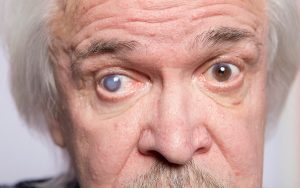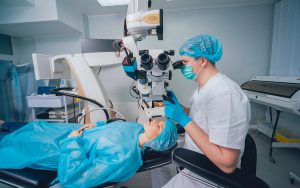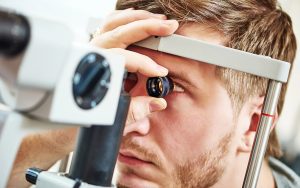What To Expect After RLE Surgery
[/vc_column_text][vc_empty_space height=”10px”][/vc_column][/vc_row][vc_row][vc_column][vc_column_text]People with weak or impaired vision can adequately improve their vision with several solutions. You could get glasses or contact lenses. Another alternative is laser eye surgery to correct vision.However, these two options are not ideal for everyone. Glasses can be pricey and impractical for sports and other activities.
Contacts are a better choicer, but you cannot wear them when swimming. Additionally, it requires you to wash your hands to prevent infection constantly.
LASIK eye surgery is a great alternative that permanently corrects your eyesight. Unfortunately, not everyone qualifies for laser eye surgery.
An ophthalmologist could recommend Refractive Lens Exchange (RLE) surgery in such a situation.
It is a surgical procedure that replaces the natural lens with an artificial one. It is ideal for people over 45 years old. You can learn more about the procedure here.
After RLE surgery, patients undergo an interesting journey. But they are all targeted to helpful recovery. If you are anxious or curious about what happens post-RLE surgery, you can find all the detailed information below.
But first,
Before The Surgery
On the day of the surgery, you should arrive well before your scheduled surgery time. This will give you enough time to confirm that your appointment is still on. You will receive eye-numbing eye drops. This is after a professional cleans the area around the eye. You will also receive eye drops to enlarge the pupil.
If you are jitty or nervous, you will also receive an injection to relax. Expect sterile coverings around your eye as you go under the microscope. An eyelid holder will keep your eyes open so don’t worry about blinking during the procedure.
What Happens After The Surgery?
The surgery takes about 20 minutes per eye. Immediately after the surgery, your pupils will remain dilated, and you will experience blurry vision. This is normal because of the microscopic light and lens fluid used in the surgery. Additionally, you may experience a gritty feeling a few hours after the treatments.
Again this is normal, and you do not need medical assistance. But you will not be able to drive home, so ensure that someone picks you up after the procedure. You can shower as usual, but avoid swimming, sports, and driving until your surgeon says it’s okay. The pupil will return to its normal size after a few hours. This will come with significant improvement in vision.
Your surgeon will prescribe eye drops to use for a recommended period. You must use these eye drops as frequently as prescribed.
The eye drops have anti-inflammatory properties that reduce the risk of swelling and pain. Additionally, they have antibacterial powers to eliminate the risk of infection.
If you get the procedure done on one eye, expect unbalanced vision before getting your next procedure. Therefore, if you can, get the procedure done on both eyes close together.
Of course, your doctor will schedule follow-up appointments to track your recovery. This is the perfect time to ask questions or share concerns about your recovery.
Studies show that relaxed patients during their recovery get quicker visual improvement. Therefore, you can schedule a few days off of work to better your chances of fast recovery.
The effects of RLE surgery are permanent, even after age-related vision changes. If you experience any pain, scarring, or complications during recovery, ensure that you consult with your surgeon as soon as possible. The procedure is safe, but it is not free from risk. So always be alert during your recovery.
What Can I Do To Minimize Recovery Time After RLE Surgery?
- Rest. Similar to any other surgical procedure, you need lots of rest. A great way to reduce recovery time is getting plenty of rest. If you can get a few days off of work, even better. Additionally, you can cut down screen time and sleep more.
- Stay away from high-risk areas. Dust, pollen, dirt, and other irritants are your enemies. They increase the chances of infection and complications. Therefore, avoid high-risk areas such as open fields, parks, and dusty roads. Additionally, avoid trips to the hairdresser for a while.
- Avoid eye makeup. Eye makeup could irritate your eyes. Additionally, some makeup ingredients could increase the chances of developing an infection. Moreover, you could struggle with the application, leading to irritation. Therefore, avoid eye makeup and wearing makeup near your eyes for a while.
- Don’t get anything in your eye. Next, avoid getting anything in your eyes because it could irritate you. You can shower and wash your face as usual; however, avoid getting soap and water in your eyes. You can even wash your hair but protect your eyes from the hair products.
- Avoid scratching and rubbing your eyes. It goes without saying, but after the surgery, scratching and rubbing your eyes is out of the question. You will irritate your eyes. Additionally, you will spread germs and bacteria to the eyes, increasing the likelihood of an infection.
- Wear sunglasses. Simply wear sunglasses if you experience any light sensitivity, irritation, or tearing due to light. The sensitivity should clear in a few days. However, to avoid irritation put on sunglasses whenever you go out. You can also wear Blue light-blocking glasses when using your computer.
- Avoid exercise and sports. While avoiding things, ensure that you do not partake in sports and other vigorous activities. Your vision is still not clear, and you could get injured. Additionally, you could get hit in the eyes or head by a projectile.
- Go on your scheduled appointments. And finally, stay loyal to all scheduled appointments. The appointments are a chance for your doctor to ensure that you are healing well without complications.




